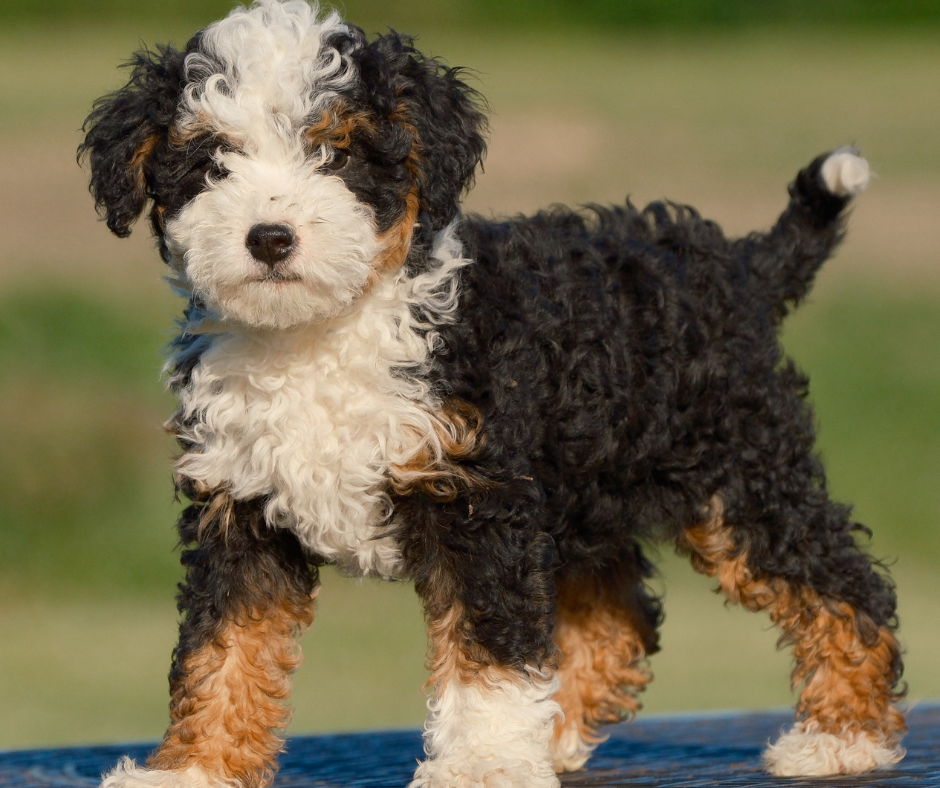
Winter Care Tips for Your Bernedoodle in Indiana
Share
In Indiana, where winters can be harsh with freezing temperatures and snow, it’s crucial to provide extra care to ensure your Bernedoodle stays healthy and comfortable.
In Indiana's winters, keep your Bernedoodle warm with regular grooming, a cozy dog coat, and paw protection from salt and ice. Limit outdoor time, ensure a balanced diet with plenty of water, and provide a warm indoor bed. Watch for signs of cold stress and maintain joint health. Use reflective gear for visibility and prepare an emergency kit for unexpected weather. Regular vet check-ups are essential for winter health.
Understanding Bernedoodle Coat Types and Winter Needs
Bernedoodles come in various coat types, including straight, wavy, and curly. Each coat type has different grooming needs and levels of insulation against the cold. Understanding your Bernedoodle's coat type is essential for determining the appropriate winter care.
- Straight Coat: This type resembles the Bernese Mountain Dog's coat, providing good insulation but requiring regular grooming to prevent matting.
- Wavy Coat: A blend of both parent breeds, this coat offers good protection against cold weather but needs frequent brushing.
- Curly Coat: Similar to the Poodle's coat, it is excellent for insulation but demands regular grooming to avoid tangles and matting.
Regardless of coat type, Bernedoodles generally have a thick undercoat that provides some natural insulation against cold weather. However, additional measures are needed to ensure they stay warm and comfortable.
Grooming and Coat Care in Winter for Your Bernedoodle
Grooming is crucial during the winter months, as a well-maintained coat helps protect your Bernedoodle from the cold. Here are some grooming tips:
- Regular Brushing: Brush your Bernedoodle's coat regularly to prevent matting, which can cause discomfort and reduce the coat's insulating properties. Use a slicker brush or comb suited to your dog's coat type.
- Bathing: Limit baths during winter to avoid drying out the skin. When necessary, use a moisturizing dog shampoo and ensure your dog is completely dry before going outside.
- Trimming: Keep the fur around your Bernedoodle's paws trimmed to prevent ice and snow buildup. This also helps avoid the formation of painful ice balls between their paw pads.
Protecting Your Bernedoodle’s Paws from Cold and Chemicals
Indiana winters often involve snow and ice, which can be harsh on your Bernedoodle's paws. Road salt and de-icing chemicals used on sidewalks can cause irritation and discomfort. To protect your dog's paws:
- Boots: Consider using dog boots to shield their paws from cold surfaces and harmful chemicals. Choose boots with a good grip to prevent slipping.
- Paw Balm: Apply a pet-safe paw balm before walks to create a protective barrier against ice, snow, and salt. This also helps prevent cracked and dry paw pads.
- Paw Cleaning: After walks, wipe your Bernedoodle's paws with a damp cloth to remove any salt or chemicals. This practice prevents them from licking these substances, which can be harmful if ingested.
Why is Nutrition and Hydration in Cold Weather Important?
Proper nutrition and hydration are vital for maintaining your Bernedoodle's health during winter. Cold weather can increase caloric needs as your dog uses more energy to stay warm. Here’s how to ensure they are well-nourished and hydrated:
- Balanced Diet: Provide a balanced diet with high-quality protein and fats to support energy levels. Consider increasing food portions slightly if your dog is very active during the winter.
- Hydration: Ensure your Bernedoodle has access to fresh water at all times. Monitor water intake, as some dogs may drink less in cold weather. Use a heated water bowl if necessary to prevent freezing.
- Supplements: Consider adding fish oil or omega-3 supplements to support coat health and reduce inflammation, especially in dry winter conditions.
What Outdoor Activities and Exercise are Advisable in the Winter
Bernedoodles are active dogs that enjoy outdoor activities. However, cold temperatures can pose risks. Here are some tips for safe outdoor play:
- Limit Exposure: Monitor the time your Bernedoodle spends outdoors in extreme cold. Short, frequent walks are better than long periods outside. Pay attention to signs of cold stress, such as shivering or reluctance to move.
- Warm-Up and Cool Down: Allow your dog to warm up indoors before going outside and cool down after exercise to prevent sudden temperature changes that could affect their health.
- Interactive Play: On particularly cold days, provide indoor activities and toys to keep your dog mentally stimulated and physically active.
Clothing and Accessories for Your Bernedoodle in the Winter
While Bernedoodles have a thick coat, they may still benefit from additional protection in freezing temperatures, especially short-haired or smaller dogs. Consider the following:
- Dog Coats: Invest in a high-quality, insulated dog coat to provide extra warmth during walks. Ensure it fits properly and does not restrict movement.
- Sweaters: For milder winter days, a sweater can offer enough warmth without overheating your Bernedoodle.
- Reflective Gear: Winter days are shorter, and visibility can be reduced in snow. Equip your dog with reflective gear or a light-up collar for safety during early morning or evening walks.
Indoor Comfort and Safety
Creating a comfortable and safe indoor environment is crucial during the winter months. Here are some tips:
- Warm Sleeping Area: Provide a warm and comfortable bed away from drafts and cold floors. Use blankets or a heated pet bed if necessary.
- Humidity: Indoor heating can dry out the air, leading to dry skin and respiratory issues. Use a humidifier to maintain a comfortable humidity level in your home.
- Safety Precautions: Ensure your home is safe by keeping potentially harmful substances, such as antifreeze, out of reach. Be cautious with space heaters and fireplaces, and never leave your dog unattended around them.
Health Monitoring and Veterinary Care
Winter can exacerbate certain health conditions in dogs, such as arthritis and respiratory issues. Regular veterinary check-ups and monitoring your Bernedoodle's health are crucial:
- Arthritis and Joint Care: Cold weather can worsen arthritis symptoms. Provide joint supplements, maintain a healthy weight, and ensure your dog has a warm and comfortable place to rest.
- Skin and Coat Health: Winter air can dry out your dog's skin. Monitor for signs of dryness, itching, or flakiness, and consult your vet for appropriate treatments.
- Cold-Related Illnesses: Be aware of symptoms of cold-related illnesses, such as frostbite and hypothermia. If you suspect your dog is suffering from these conditions, seek veterinary care immediately.
How to Travel with Your Bernedoodle
If you plan to travel with your Bernedoodle during winter, consider the following precautions:
- Car Safety: Keep your dog warm in the car by using blankets and maintaining a comfortable temperature. Never leave your dog unattended in a cold car, as temperatures can drop quickly.
- Travel Gear: Bring essentials like food, water, a warm blanket, and any medications your dog needs. Make sure your dog's ID tags and microchip information are up-to-date in case of separation.
- Accommodations: Ensure that your destination is pet-friendly and provides a warm and safe environment for your dog. Research local veterinarians in case of emergencies.
Emergency Preparedness
Winter weather can be unpredictable, so it’s essential to be prepared for emergencies:
- Emergency Kit: Prepare an emergency kit that includes food, water, medications, a first-aid kit, and warm blankets. This kit should be easily accessible in case of power outages or severe weather.
- Weather Monitoring: Keep an eye on weather forecasts and adjust your dog's outdoor activities accordingly. Avoid travel during severe weather conditions whenever possible.
- Communication Plan: Have a plan in place for how to communicate and reunite with your dog in case of separation during an emergency.
Caring for a Bernedoodle during Indiana's winter requires thoughtful planning and attention to detail. By understanding your dog's specific needs, from grooming and nutrition to outdoor activities and emergency preparedness, you can ensure your Bernedoodle stays healthy, happy, and comfortable throughout the cold season. Remember, each Bernedoodle is unique, so tailor these tips to suit your dog's individual needs and lifestyle. With proper care, winter can be an enjoyable and safe time for both you and your furry companion.
